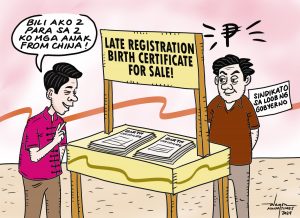We strongly agree with the position of the City Government of Davao not to support the new selection process for the next Indigenous Peoples Mandatory Representative (IPMR) to the city’s Sangguniang Panlungsod vice hold-over Bai Halila Sudagar.
The local government’s legal department could not have been more correct in advising the mayor that the case of mandamus filed by Bai Cherry Ann Codilla with the Regional Trial Court Branch 15 must be resolved first before another selection process be undertaken. Codilla who won in the selection last April 12, 2018, was rejected by the National Commission on the Indigenous Peoples (NCIP) for her alleged lack of genealogy as Bagobo-Clata, the tribe that is set to represent the lumads in the city council.
Codilla sought the assistance of Mayor Sara claiming she was allegedly “unjustly deprived” of being officially proclaimed the IPMR.
Of course, the NCIP may have its own interpretation of the law that governs the selection process of the IPs’ representation in the local legislative body. And there is no doubt that it is the basis of its rejection of Codilla.
But whether or not the NCIP is correct with its interpretation of the law and the processes in its implementation, or it is the city’s legal department that is right, only the court can say.
Hence, the resolution of Codilla’s case of mandamus is a must before a new selection process of the next IPMR in the city council can be done.
Of course from wherever angle the law on the IPMR is viewed it is crystal clear that it is crafted in a manner where politics is allowed to rear its ugly head on its processes.
In the choice of would-be candidates from among the different ethnic groups perceived closeness to the powers that be — that is, either the local, or the national government through the NCIP — is primordial consideration. Other qualifications of a potential nominee are almost always relegated to the back burner.
The case of Codilla is classic. She won handily over other aspirants because she was seen or believed close to the city administration. But the NCIP which is a national government entity, by its interpretation of the IPMR law, rightly or wrongly, may have also other lumad personality in mind. So it is able to find sufficient grounds to anchor its rejection.
Again, our hunch could only be validated or negated once the court rules on the mandamus case of the rejected Bai Cherry Ann Codilla.
Therefore, we feel it is imperative that the court resolve without further delay the said case so that the rightful IPMR will be installed for the benefit of the indigenous peoples of the city.
Can the court please hasten its resolution of Codilla’s mandamus to be fair to her and the city’s various IP communities?
****************
We also back four square the proposition of Albay congressman Edcel Lagman for Congress to “seriously review” the enabling law that implements the Partylist system that the 1987 Constitution provides as additional members of the Lower House.
The framers of the 1987 Charter included the provision on the Partylist system to allow representation of the country’s marginalized sectors or groups such as labor, peasants, urban poor, indigenous people, women, youth and other such sectors that may be defined by the law (except the religious sector) in Congress. (Highlighting through italicization ours).
But we are certain that it was in the process of making the enabling law to make this provision on the Partylist system implementable that the politicians found the opportunity to bastardize the same. It is to suit their own vested interest.
Yes, the politicians in the Congress that was convened during the first election after the dictatorship took advantage in the leeway that was provided by that portion of the provision that says, other such sectors that may be defined by the law.
Since the Congressmen and Senators were the ones who made the law, then they had the privilege of defining what are these other such sectors.
So it was clear that the lawmakers never had any hesitation that in determining the sectors concerned what they have in mind was ensuring their continuous hold on power even if there are expressed provisions of limiting their terms.
In other words, the lawmakers, using that particular provision of the Constitution, were able to create back and side doors through which they can reenter and re-occupy their seats in the national legislature even after their terms have supposedly expired using their closest kin or blind followers as substitutes.
And as to the exception of the religious sector how come the Commission on Elections (COMELEC) was never able to look into the connection of the CIBAC Partylist with that provision when its first nominee is the top honcho of a known religious group?
That should have snowballed some intrigues. But apparently the poll body has preferred to be blind and deaf.
What marginalized sector is the 1987 Constitution talking about?


